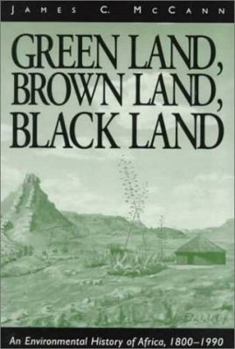Green Land, Brown Land, Black Land: An Environmental History of Africa, 1800-1990
James C. McCann provides a synthesis of evidence and a narrative of Africa's evironmental history over the past two centuries. In a book readily accessible to undergraduates and nonspecialists, Professor McCann argues that far from being pristine and primordial spaces, Africa's landscapes were created by human activity. This argument contrasts strongly with the idealized notions of an African Eden commonly held in the West and in Africa itself. It also confronts more recent alarm about degradation of Africa's natural and human resources by examining the historical evidence of environmental change. Key topics within the book are the effects of population growth, disease, agricultural change, the state of natural resources, and the changing role of the state in how Africans have managed and changed their own landscapes.
Format:Paperback
Language:English
ISBN:0325000964
ISBN13:9780325000961
Release Date:April 1999
Publisher:Heinemann Educational Books
Length:216 Pages
Weight:0.75 lbs.
Dimensions:0.5" x 6.1" x 9.2"
Age Range:18 years and up
Grade Range:Postsecondary and higher
Customer Reviews
1 rating
EXCELLENT Work
Published by Thriftbooks.com User , 23 years ago
I read this book for an undergraduate course in comparative environmental history. McCann dispells common myths about Africa (static, has been in environmental decline throughout its history). Instead, he argues that Africa's environmental history can't be judged in a linear perspective - it is neither "declensionist" (continued decline) nor progressive (environment always being improved by people). His book places African agriculturalists within a larger framework of history. Several chapters discuss the role of politics in impacting local environmental change. This a valuable perspective and shows that environmental history has many applications in public policy (implied connections that are mentioned but not developed within the book).





